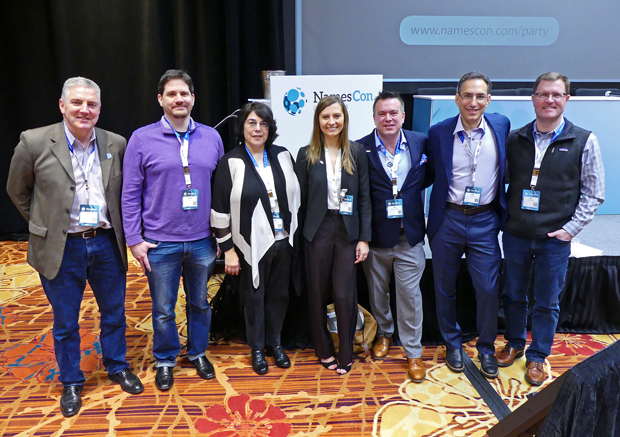For anyone who has been in the domain industry for a while, Nat Cohen needs no introduction. When we compiled the data for our first Liquid Market Report in 2016, I was surprised to learn that Nat, through his company Telepathy, is one of the largest holders of liquid domains in the world, with over 1,000 3L .com (the largest 3L portfolio in the world), multiple 2L .com domains and an incredible portfolio of one word .com.
Not only is Nat an extremely successful investor, but he is also an advocate of the domain industry through his involvement with the ICA, the Internet Commerce Association (disclosure: I am also a member) which protects the rights of domain investors. Despite being outspoken and active in the industry, I have always been curious to find out more about Nat’s personal life and how he got to where he is. Without further ado, enjoy this wide-ranging conversation with Nat Cohen:

Where do you live and why?
I live in Washington, DC. During college I did an internship at the Department of Commerce and worked there after graduating. I then met my wife here and we settled down. Fortunately DC has become a much more livable and vibrant city over the years.
What did you want to be as a kid growing up?
I was interested in history and economics and saw that government policies make a huge difference in people’s lives, so I thought I could try to make a positive difference there. My early experiences working 9-5 motivated me to reclaim my time by becoming financially independent.
How did you first get involved with domain names?
My quest for financial independence led me to try to “figure out” the stock market. After experimenting with short selling, including of Y2K stocks, in 1997 I decided to launch a website called BearTracker.com where I could share my research, but I didn’t know how to register the domain name. In searching for how to register a domain name, I stumbled across a website called iGoldrush with articles about domain investing. That immediately piqued my curiosity and I stayed up until the early hours of the morning brainstorming domain names to see what was available. Unfortunately, even back then, all the best domain names were already taken.
I was interested in history and economics and saw that government policies make a huge difference in people’s lives, so I thought I could try to make a positive difference there.

Why did you name your company “Telepathy”?
When I first started treating domain investment as a business, I called it PrimeDomains. When the time came to formally incorporate, I wanted a less descriptive name and spent a while trying to come up with a better name that had a matching domain name available – without luck. I eventually looked through the domain names I had already registered and the only one that stood out was “Telepathy.com” so I went with that mainly because I already had. it. My mother did not like the name “Telepathy”. She said it sounded nutty and people wouldn’t take me seriously. Over the years, a few people have written letters to the business address describing hearing voices in their head and wanting to learn more about telepathy.
You started investing in domains in the 1990s. How has the domain market changed since you started in the industry? Do you think it is easier or harder for someone to start out?
I think it is much harder now. The industry has matured, it is no longer undiscovered, and the competition is intense.
Even though the best names were taken when I started, there was still tremendous opportunity. Great domain names were dropping all the time, and sometimes sitting unregistered for hours or days. The resale market hadn’t developed so it was possible to buy great domains from existing owners at relatively low prices – in part because it was a new concept that domain names had resale value, and my offers were far higher than the owners’ costs and no one was offering more. There were only a small group of people seriously engaged in domain investing at the time, and many had different strategies and focuses, so in one’s own niche there was often not that much competition.
The advantage of starting now is that you are entering into an already thriving market. Businesses now “get” the importance of having a quality domain name. Demand for domain names and acquisition budgets have never been higher. There is also now a wealth of expert advice and a tremendous number of resources available to new investors to help them avoid losing money through costly trial and error mistakes.
In short, the supply was better before, while the demand is better now. I feel lucky that I got into the business when I did. I’m particularly impressed with the folks who entered the industry recently and through their creativity and resourcefulness have overcome the challenges to become successful.
What do you feel are the most common mistakes beginner domain investors make?
Registering a lot of low-quality names is a common mistake. Sometimes this happens because a beginner investor will mistakenly assume that news of one unusually lucky sale of a mediocre domain name means that all similar mediocre domain names have excellent resale potential.
Another way that beginning investors can get tripped up is by focusing on the return on investment (ROI) of an individual sale, rather than the ROI of the investment in the entire portfolio. Buying a domain name on the drop for $100 and selling it three years later for $5,000 sounds like a hugely profitable win. But if that’s your only sale and you’re sitting on 99 other domain names that you also paid $100 each for and renewed for two years, then you’re facing a large cash deficit, not even taking into account the hundreds of hours of your own time that you devoted.
If the quality isn’t there, domain registration can be a losing game. The only business that is guaranteed to generate revenue from your domain registration is the registry that is selling you a couple of electrons in exchange for real money. Not until you start generating positive cash flow from domain sales and/or traffic revenue, can you say that you have a profitable business instead of having thrown your money away.
If you had only $10,000 and wanted to start investing in domain names, what would you do?
I’d have to be willing to hustle and to devote the hours – the money isn’t enough.
If you are winning names at high profile auctions, then you are paying more than anyone else in the industry is willing to for that domain name – which isn’t a great way to start. You need to do the research to find an undiscovered niche or do the hard work to find quality domain names in private hands that are available for below market prices. Your success may then depend on your velocity of activity – how quickly you can sell for a profit and reinvest, and in that way start building the value of your portfolio.
I started with the crazy notion of risking $5,000 of my savings to register 50 mediocre domain names, for at the time each one cost $100 to register. It turned out to be a bad investment. Even all these years later I’ve barely sold any of those 50 domain names. But I was lucky and after a few months of searching stumbled across dropping domain names and started being able to register better quality names that led to the first sales.
Demand for domain names and acquisition budgets have never been higher.

How does your personal domain investment strategy look like? What metrics/features do you look for in domains you want to buy?
In some sense, domain investors are offering an online branding service. We’re like those branding companies that come up with new names for products and start-ups, but we have to be able to provide the matching domain name too.
My focus has been primarily on “brandable” rather than “keyword” domain names. Both approaches work, but the first one comes more naturally to me.
I view a domain name as, essentially, a Name. When evaluating a domain name, I ask whether I could imagine a business wanting to choose this domain name as the name for their company. Most of the time, the answer is “no”. Even among one-word dot-com domain names that seem similar, some work much better as a name for a company than others.
Another question in evaluating a domain name is how easy it is for a business to substitute a different domain name for that domain name. If there are many equally good alternatives, then you have no pricing power. You get the sale by being the cheapest of all the equivalent alternatives, which is not a great position to be in. If you are offering a domain name for which there are no attractive alternatives, then the domain name will likely have more value to the buyer and you’ll be in a better position to negotiate a favorable sales price.
A benefit of keyword domain names is that it is much easier to identify likely buyers. If you are selling printers.com, it isn’t much work to develop a list of likely prospects. Owners of keyword domains can productively do outbound marketing, while that’s usually pointless for owners of “empty vessel” brandable one-word dot-com domain names, for it is nearly impossible to identify prospective buyers in advance.
I’m forced to be patient. Many of my sales are domain names that I’ve held for over 20 years.
When it comes to domain investing, what do you think is your superpower?
I feel fortunate I recognized the opportunity when I first learned about domain investing. I am also lucky that I was able to acquire some quality domain names early on – that gave me a base to grow from.
There are many other people in the industry who are much more talented than I am – they recognize new opportunities more quickly, they are better at acquiring domain names, they hustle more, they are better at assessing how much an end-user will pay for a domain name, they know how to scale up faster… the list goes on and on.
The growth of the value of Telepathy’s portfolio is mainly due to the gradual compounding effects over a couple of decades of repeatedly reinvesting the proceeds of the sale of one domain into acquiring a few similar quality domain names.
If there are many equally good alternatives, then you have no pricing power.

What is the most useful insight applied to domain names that you learned from your MBA?
Tough question.
You are heavily involved in the protection of domain owners through your work at the ICA. What do you think are the biggest threats for the domain industry?
There is no guaranteed right to invest in domain names. Some countries effectively ban domain investing in their ccTLDs. Many influential people involved with the Internet would like to shut down or scale back domain investing. The industry still has to combat outdated views of our business as “hoarders”, “squatters” and “parasites”.
The domain governance system is structured so that it is not accountable to registrants – or to the general public. At both ICANN and in the UDRP the system is controlled by folks who, in general, have a negative view of domain investors. They have the power, ability and inclination to weaken our rights to our domain names and to impose restrictions on how we can operate.
One has to understand their perspective to understand why they support policies that undermine domain investing. They ask, “why is it in the public interest to allow one company to control thousands or tens of thousands of domain names that they have no use for themselves and the only purpose is to sell it to a ‘real’ business at a vastly inflated price?”. Or “between two companies, who should have the right to a domain name – the one who is operating a business on that name and who has a trademark on the name – or the one who is holding it ‘hostage’ and demanding an extortionate ‘ransom’ to relinquish the domain name to the legitimate user?”.
These perspectives lead to policies that weaken ownership rights, transfer value in domain names away from domain registrants, and impede the ability to freely buy and sell domain names. I discussed some examples of specific threats in a recent NamePros post.
We need to keep working hard to counter these negative perceptions. We have a strong case to make. No business is entitled to a non-distinctive domain name, even if they chose to build their brand on a non-distinctive term. These domains have inherent value – not because of any business use, but because they are meaningful and/or memorable in their own right. Speculation and investment occur in every asset class and domain name investors should not be singled out for criticism. There are many domain registrants besides domain investors who want to take advantage of the domain aftermarket and who engage in the profitable resale of domain names, from a huge corporation who no longer needs domain names obtained through the acquisition of other companies, to a small business owner who is retiring and wants to cash out of a valuable domain name. Most importantly, domain name investors provide a valuable service by creating liquidity for an asset that is otherwise quite illiquid.
As the song in Hamilton puts it, you need a seat at the table where the game is played. You need to be in the room where it happens. The ICA gives the domain industry the seat at the table. Thanks to the ICA, domain investors are part of the conversation and have the ability to affect policy outcomes. If not for the ICA, the domain industry would largely be shut out and would be at the mercy of others to determine our fate. The ICA’s General Counsel, Zak Muscovitch, our Executive Director, Kamila Sekiewicz, the Board of the ICA and all the members of the ICA (including Giuseppe) do the hard work and contribute the resources to counter threats to the livelihoods of those of us in the domain industry so the industry can keep thriving and growing. We owe them all a debt of thanks – and our support. In addition, the ICA is a great community of industry leaders and participants that support each other.
The ICA gives the domain industry the seat at the table. Thanks to the ICA, domain investors are part of the conversation and have the ability to affect policy outcomes.

Photo by Ron Jackson
What do you think needs to happen for the domain industry to outgrow its current status and for domains to become a widely held investment asset class, similar to Real Estate?
I think the perceptions of the domain industry are gradually changing for the better over time as people recognize the resale of domain names as a normal business activity and as an ever-growing number of people and businesses engage with the domain name aftermarket and recognize domain names as valuable digital assets.
Strengthening ownership rights is a key step to legitimizing domain names as an asset class. Whenever you register a domain name you are forced to swallow a bit of poison that could prove fatal. The bit of poison is that you are agreeing that one or more of a group of people throughout the world, appointed through a hidden process by various unaccountable organizations, can terminate your rights to that domain name if they determine, according to vague and subjective criteria, and at their sole discretion, that you registered and used the domain name in bad faith. Until domain ownership is strengthened and investing in domain names is better protected, domain names have a major weakness as an asset class.
UDRP panelists are empowered to declare normal business activities in the domain industry as off-limits, bad faith behavior, and thus a violation of the UDRP. For instance, domain investors have lost flamingo.com because of a PPC link, lost vtp.com (one of 15 3-letter dot-com domain names acquired from BuyDomains for $40,000 each) in a complaint filed a month after the acquisition, and lost ado.com because the asking price was considered too high. UDRP panelists’ interference in the proper functioning of the domain name aftermarket through the arbitrary exercise of their power to terminate ownership rights makes domain names less appealing as an asset class.
Another issue is clarifying ownership and having a secure chain of title. With the lack of an official historical ownership record, and with the suppression of public ownership information, it is difficult to know whether the person offering a domain name for sale actually is the legitimate owner and that there isn’t someone else who can make a claim to be the owner. Control over the domain name is effective ownership but it is not legal ownership. In real estate there are recorded titles and title searches to confirm a clean chain of ownership. Domain names lack any accurate way to independently verify ownership.
Lack of liquidity in another significant obstacle to domain names as an asset class. On the stock market the spread between the price to buy and sell a share is usually a few cents. With domain names, the price to purchase a domain name as an end-user is often many times the liquidation value. That enormous spread is required since domain names are so illiquid, but that enormous spread and lack of liquidity makes them less attractive as an investment quality asset.
What is your impression of the people in the domain industry?
I used to work for large organizations where creativity, innovation and risk-taking were stifled. These jobs tend to attract cautious people who prefer a predictable routine.
The folks in the domain industry are living by their wits. They take risks. They discover opportunities. They are creative, intelligent and bold. I enjoy getting to know them and despite it being a virtual business have become friends with many.
What are your favorite domain tools and services?
I go to NameBio to research market prices, DomainTools for ownership history, and LinkedIn for commercial uses of a term. I check on the auctions at DropCatch, NameJet and GoDaddy. I use UDRP.tools, a site that I developed with Kevin Ohashi and Michael Sumner, to research UDRP disputes.
The folks in the domain industry are living by their wits. They take risks. They discover opportunities. They are creative, intelligent and bold. I enjoy getting to know them and despite it being a virtual business have become friends with many.

Photo by Ron Jackson.
What is your favorite non-domain related book(s), blog(s) and app(s)?
I enjoyed Sapiens by Yuval Noah Harari and thought it was brilliant. Disgrace by J.M. Coetzee has stuck with me for a long time. 1984 had a lasting impact on me as a teenager.
After paying little attention to Twitter for years, I got sucked into it when Covid struck and can spend a lot of time on it each day. The direct access to the thoughts of notable people around the globe is wonderful, but it can also be overwhelming and repetitive and overflowing with outrage.
What does your average day look like?
Lately I’ve scaled back the time spent on domain names. I’ll work on the domain business and ICA matters off and on throughout the day and evening, while mixing in taking care of other things. I try to spend some time cooking, baking, improving my non-existent handyman skills, and on tennis and sailing. I’m still trying to figure out the stock market. I enjoy games and puzzles and play poker and do the NYT crossword. I have two teenagers at home who can keep me busy.
How can people find you?
My direct email is ncohen at telepathy.com. I’m on Twitter and LinkedIn.
Any parting notes or comments?
In the current environment, we’re even more fortunate to be in the business we’re in. Looking forward to seeing folks in person again.

5 responses to “Industry Interviews – Nat Cohen (Telepathy)”
thanks for another great interview Guiseppe!
have always admired and respected Nat for having had the foresight into domains very early on and for his level of integrity in all things.
from him being a worthy adversary as ‘pod’ back in the drop days to his zero tolerance policy for folks trying to bully his domains away from him, he has been a voice and a role model for so many of us over the years.
Thanks for this Guiseppe! My comments regarding Nat can fill volumes. Let’s just say he has been a friend and associate of mine for over 12 years and was loyal beyond imagination to support my endeavors in the domain development business. We all need help from time to time, and Nat is one of those special people not only in the domain industry, but in any industry that I have ever encountered. He deserves all the success he is enjoying, and more. Nat, I am happy to sing your praises publicly, and thank you for everything over the years. Continued success, happiness and health for you and your family.
Great interview. When Nate Cohen speaks, I stop everything and listen.
As much as I would love to, I can’t really say anything more of Nat than has already been said. All I can really say is that having known him for about 20 years now, every glowing word you’ve ever read is true. I’d argue he’s the best domainer ever, not just because of his portfolio (which is indeed legendary), but because he’s also the best person ever that just happens to be a legendary domainer. Thanks for every nugget of wisdom you’ve imparted on me Nat!
[…] through some old research, I happened to re-read this excellent interview that the well-respected Giuseppe Graziano from GGRG.com did with industry […]